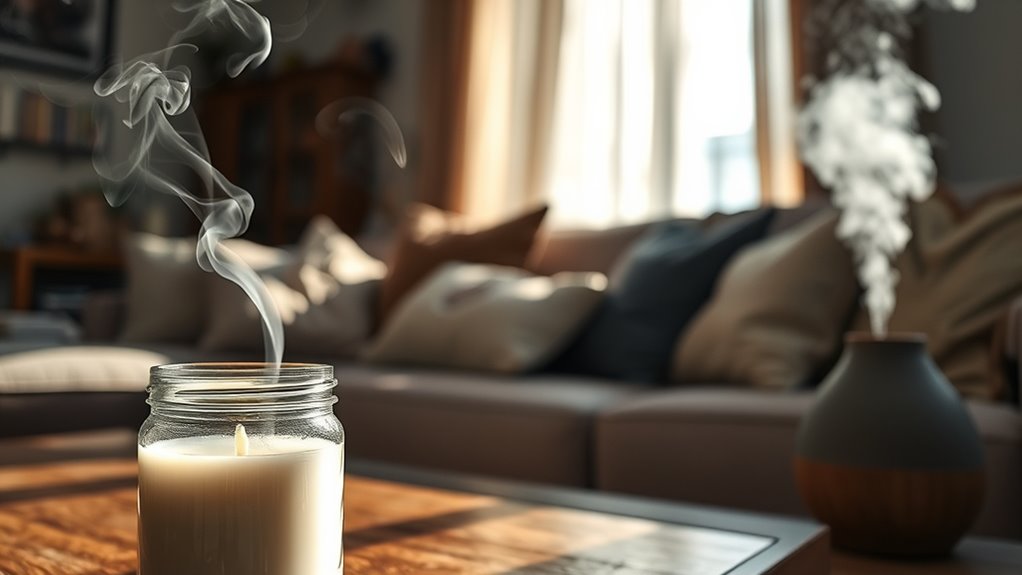Synthetic fragrances in candles, air fresheners, and cleaning products often release harmful chemicals into your home’s air, risking health problems like headaches or asthma. These scents mask odors but can quietly pollute your environment and linger long after use. To protect yourself, avoid products with artificial fragrances and opt for natural alternatives like essential oils or simmering herbs. If you want to discover safe ways to keep your home smelling fresh, there’s more to learn.
Key Takeaways
- Synthetic fragrances in candles and air fresheners release airborne pollutants harmful to indoor air quality.
- Many scented products contain volatile organic compounds (VOCs) and phthalates that linger and impact health.
- Artificial fragrances can trigger respiratory issues, allergies, headaches, and dizziness in sensitive individuals.
- Using commercial scented products often masks odors but introduces harmful chemicals into indoor air.
- Lack of proper ventilation can cause these chemical pollutants to accumulate, worsening indoor air quality.

Many popular home scents, from candles to air fresheners, may make your house smell good temporarily but can actually harm your indoor air quality. These products often contain synthetic fragrances and chemicals that, while designed to mask odors, can introduce airborne pollutants into your environment. If you have chemical sensitivities or respiratory issues, these scents can trigger symptoms like headaches, dizziness, or asthma attacks. It’s essential to recognize that what smells pleasant initially might be secretly compromising your health. Instead of relying solely on commercial scent products, consider natural alternatives that are safer and less likely to cause adverse reactions.
Many home scents may smell nice but harm indoor air quality and health.
Natural alternatives include using essential oils, which offer a range of pleasant aromas without the synthetic chemicals found in many commercial air fresheners. When choosing essential oils, opt for high-quality, pure products, and use a diffuser to disperse the scent evenly throughout your space. Not only do these oils provide a more authentic and calming aroma, but they also avoid the synthetic chemicals that can irritate your lungs and skin. Additionally, you can try simmering herbs and spices like cinnamon sticks, cloves, or citrus peels on the stove to naturally freshen your home. These methods are not only chemical-free but also customizable to your preferred scents.
Addressing chemical sensitivities is vital in maintaining good indoor air quality. Many household products contain volatile organic compounds (VOCs) and phthalates, which can linger in the air and cause health issues over time. If you notice symptoms like sneezing, congestion, or fatigue when exposed to certain scents, it’s likely related to these chemicals. To reduce exposure, cut back on scented products and read labels carefully. Look for items labeled as free from synthetic fragrances and harmful chemicals. Ventilating your home regularly can also help clear out lingering pollutants and improve overall air quality.
In addition, choose unscented or minimally scented cleaning supplies and personal care products whenever possible. These tend to contain fewer chemicals that can contribute to poor indoor air. When it comes to maintaining a fresh-smelling home, simple natural alternatives often outperform synthetic options in safety and effectiveness. By making these switches, you’re not only protecting your respiratory health but also creating a more inviting environment for everyone, especially those with chemical sensitivities. Research indicates that synthetic fragrances and chemicals in household products can negatively impact indoor air quality, emphasizing the importance of natural choices. Remember, a fresh home doesn’t have to come at the expense of your health—embrace natural scents and avoid the pitfalls of harmful chemicals.
Frequently Asked Questions
Can Scented Candles Worsen Indoor Air Quality?
Yes, scented candles can worsen indoor air quality. They release chemical pollutants like volatile organic compounds (VOCs) and particulate matter, which can irritate your lungs and trigger allergies. When you burn scented candles, you’re exposing yourself to these pollutants, increasing the risk of respiratory issues and allergy symptoms. To keep your home healthier, consider switching to unscented candles or alternative air freshening methods that don’t introduce harmful chemicals.
Are Natural Essential Oils Safer Than Synthetic Fragrances?
Yes, natural essential oils are generally safer than synthetic fragrances because they offer simpler aroma complexity and tend to have smoother fragrance longevity. You can enjoy a more authentic scent without the harsh chemicals found in synthetics. By choosing natural oils, you reduce the risk of indoor air pollution, making your home a healthier environment. Always opt for high-quality, pure essential oils to maximize benefits and minimize potential irritants.
How Do Artificial Air Fresheners Affect Respiratory Health?
Artificial air fresheners can negatively impact your respiratory health by releasing chemical irritants that may cause coughing, sneezing, or asthma symptoms. These products often contain allergy triggers like phthalates and volatile organic compounds (VOCs), which can inflame your airways and worsen existing respiratory issues. To protect yourself, opt for natural alternatives and guarantee proper ventilation, minimizing exposure to these harmful chemicals and reducing your risk of respiratory discomfort.
What Are the Long-Term Effects of Scent Chemicals Indoors?
Think of scent chemicals as silent intruders slowly building a fortress inside your home. Long-term, chronic exposure can lead to chemical buildup in your lungs and body, increasing risks of respiratory issues, allergies, and even hormonal disruptions. Over time, these invisible invaders can weaken your immune system, making you more vulnerable to illnesses. Protect yourself by choosing natural alternatives and ensuring proper ventilation to break the cycle of silent damage.
Can Opening Windows Eliminate Scent-Related Air Pollution?
Opening windows can help improve air exchange and reduce scent-related air pollution, but it might not fully eliminate it, especially if your home has strong or persistent odors. To maximize ventilation, use strategic ventilation strategies like exhaust fans or air purifiers alongside opening windows. This combined approach guarantees better circulation, dilutes scent chemicals, and helps maintain healthier indoor air quality overall.
Conclusion
By now, you see how many common scents can silently harm your home’s air quality. Wouldn’t you prefer a healthier, fresher living space for you and your loved ones? Avoiding artificial fragrances and opting for natural alternatives can make a real difference. Remember, your home’s air quality impacts your well-being more than you think. Isn’t it time you took control and created a safer environment where you can truly breathe easy?









